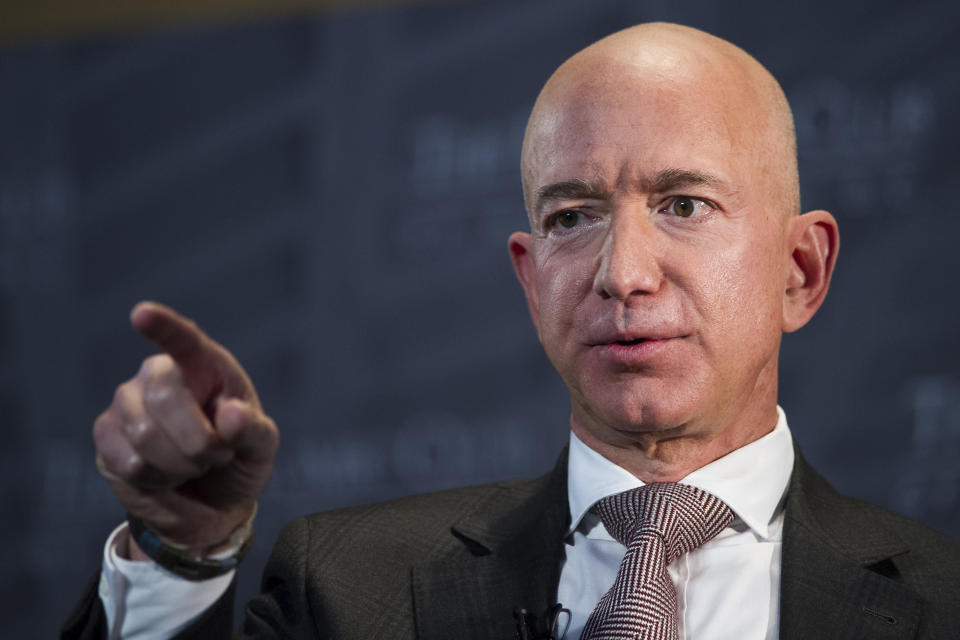Amazon CEO Jeff Bezos: You need to fail more 'to move the needle'
Jeff Bezos is out with his annual letter to shareholders. The Amazon founder has been writing the annual letter for 23 years, and attaches a copy of the first one from 1997 every year to both showcase how much progress has been made but also to remember the ethos that launched the company from “Day 1.”
Amazon didn’t turn an annual profit until 2003, eight years after it began operations in 1994. A common thread throughout Bezos’s annual reflections is about the pitfalls that he’s had to overcome along his journey to building one of the most valuable companies in the world.
The greater the success you want to achieve, the bolder you have to be about taking risks that could end up in failure, Bezos explains in his letter.

“As a company grows, everything needs to scale, including the size of your failed experiments. If the size of your failures isn’t growing, you’re not going to be inventing at a size that can actually move the needle. Amazon will be experimenting at the right scale for a company of our size if we occasionally have multibillion-dollar failures,” he writes in the final section of his letter with the heading “Failure needs to scale too.”
‘We won’t undertake such experiments cavalierly’
Bezos gives the caveat that none of these decisions are impulsive in the slightest.
“Of course, we won’t undertake such experiments cavalierly. We will work hard to make them good bets, but not all good bets will ultimately pay out. This kind of large-scale risk taking is part of the service we as a large company can provide to our customers and to society. The good news for shareowners is that a single big winning bet can more than cover the cost of many losers,” he wrote.
Perhaps he’s alluding to the $13.7 billion bet Amazon made on Whole Foods. During the company’s fourth quarter earnings report, one negative number really caught the attention of investors: the company saw a 3% year-over-year decline in physical stores sales.
Bezos shared the story of one epic success and one epic failure that happened concurrently — the Fire phone and the Echo, which eventually led to the now ubiquitous Alexa.
“From Amazon’s early days, machine learning was an essential part of our product recommendations, and AWS gave us a front row seat to the capabilities of the cloud. After many years of development, Echo debuted in 2014, powered by Alexa, who lives in the AWS cloud,” he writes.
He pointed out that “no customer was asking for Echo” and that market research didn’t inform the company’s decision-making.
“Since that first-generation Echo, customers have purchased more than 100 million Alexa-enabled devices. There are now more than 150 different products available with Alexa built-in, from headphones and PCs to cars and smart home devices.”
Been an honor & pleasure having Tom Alberg on Amazon’s Board. Tom joined in 1996 and has been with us ever since - over 22 years. I’ll miss his sound judgment, deep well of business & life experience, and his quick wit. He's a smart business person and even better human. Thx Tom!
— Jeff Bezos (@JeffBezos) April 11, 2019
Also on Thursday, Amazon’s longest-serving board member, Tom Alberg, announced he would be stepping down. The founder of Madrona Venture Group was one of the first investors to take a chance on Bezos’s pipe dream 22 years ago. And he stuck along for Amazon’s many failures.
Melody Hahm is a senior writer at Yahoo Finance, covering entrepreneurship, technology and real estate. Follow her on Twitter @melodyhahm. She hosts Breakouts, a monthly interview series for Yahoo Finance featuring up-close and intimate conversations with today’s most innovative business leaders.
Read more:
